

Useless Plastic. Every action leads to a bigger impact.
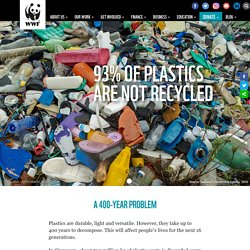
Help us understand your plastic consumption better by completing the WWF Plastics Survey. Do your part by using less plastic, and support business and government measures that help do so. Businesses have the potential to transform how we use plastics. This includes being responsible for the entire lifecycle of plastics, which includes measures to: Create bio-based plastics from plant sources.Reduce plastic packaging and opting for lighter, more durable packaging.Working with customers to recover used packaging from products. A lasting solution lies in a systemic change to make plastics more useful, even as we use less plastic. Support the procurement of recycled material.Create an aftermarket for recycled plastics.Promote recycling as a lifestyle choice. Individuals, businesses and government need to come together to make this possible.
Every action leads to a bigger impact. Businesses have the potential to transform how we use plastics. 7 Things You Didn’t Know About Plastic (and Recycling) – National Geographic Society Newsroom. For many, environmentalism begins with the recycling symbol and ends at the recycling bin.
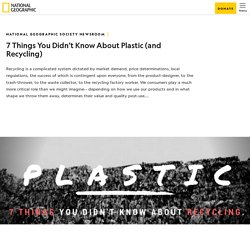
The simple act of throwing something away into a large box marked with a recycling sign is enough to make some of us feel like we’ve done our part. It’s like eating only half of a chocolate chip cookie– we indulge, but not that much. Similarly, our faith in the magic of the recycling bin makes purchasing and using plastic products a little more guilt-free. But recycling is a lot more complicated, and the process of recycling plastics is significantly less transparent than the much-Googled recipe for baking cookies.
20 Plastic Items You Need to Stop Using Today - Aware Impact. Plastic was invented only about 70 years ago, however, this material has already created a mess on the planet.
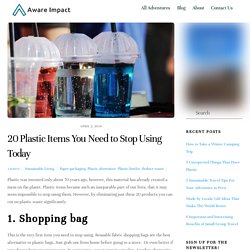
Plastic items became such an inseparable part of our lives, that it may seem impossible to stop using them. However, by eliminating just these 20 products you can cut on plastic waste significantly. 1. Shopping bag This is the very first item you need to stop using. 2. 10 Shocking Facts About Plastic. Plastic Oceans International. Plastic Consumption - an overview. 2.7 Recycled plastics The effects of the huge worldwide plastic consumption are in the eyes of everyone.
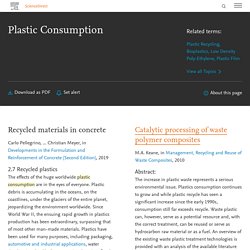
Plastic debris is accumulating in the oceans, on the coastlines, under the glaciers of the entire planet, jeopardizing the environment worldwide. Since World War II, the ensuing rapid growth in plastics production has been extraordinary, surpassing that of most other man-made materials. Plastics have been used for many purposes, including packaging, automotive and industrial applications, water desalination, land/soil conservation, housing, flood prevention, medical delivery systems, artificial implants, other healthcare applications, preservation and distribution of food, communication materials, security systems, and so on. The vast majority of monomers used to produce plastics, such as ethylene and propylene, are derived from fossil hydrocarbons. Further research is needed to develop methods to replace larger volumes of aggregate with recycled plastics.
History and Future of Plastics. What Are Plastics and Where Do They Come From?
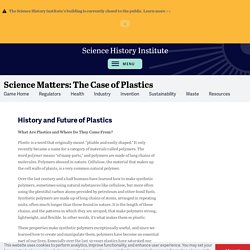
Plastic is a word that originally meant “pliable and easily shaped.” It only recently became a name for a category of materials called polymers. The word polymer means “of many parts,” and polymers are made of long chains of molecules. Polymers abound in nature. Cellulose, the material that makes up the cell walls of plants, is a very common natural polymer. Smithsonian Ocean. Plastic as Food In the 1960s a worrying trend became apparent.
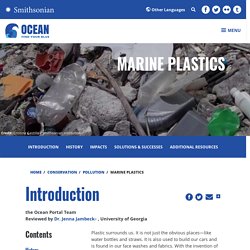
Plastic: The Problem And Its Impact – Impact Hub. WWF and Impact Hub join forces for the oceans.

This blog post is part of a wider campaign aiming to share knowledge about environmental challenges within our communities. “Plastics have transformed our lives: revolutionized medicine, lighten every car and jumbo jet today, saving fuel—and pollution. In the form of clingy, light-as-air wraps, they extend the life of fresh food. More Recycling Won't Solve Plastic Pollution. The only thing worse than being lied to is not knowing you’re being lied to. It’s true that plastic pollution is a huge problem, of planetary proportions. And it’s true we could all do more to reduce our plastic footprint. The lie is that blame for the plastic problem is wasteful consumers and that changing our individual habits will fix it. Recycling plastic is to saving the Earth what hammering a nail is to halting a falling skyscraper.
You struggle to find a place to do it and feel pleased when you succeed. As an ecologist and evolutionary biologist, I have had a disturbing window into the accumulating literature on the hazards of plastic pollution. Plastics also accumulate up the food chain, and studies now show that we are likely ingesting it ourselves in seafood. Read more from this special report: Beginning in the 1950s, big beverage companies like Coca-Cola and Anheuser-Busch, along with Phillip Morris and others, formed a non-profit called Keep America Beautiful.
Plastic Pollution. The Problem With Plastic. Nothing exemplifies modernity like plastic.
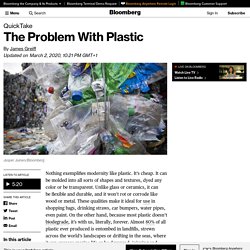
It’s cheap. It can be molded into all sorts of shapes and textures, dyed any color or be transparent. Unlike glass or ceramics, it can be flexible and durable, and it won’t rot or corrode like wood or metal. These qualities make it ideal for use in shopping bags, drinking straws, car bumpers, water pipes, even paint. On the other hand, because most plastic doesn’t biodegrade, it’s with us, literally, forever. A Singapore Perspective on Plastic Pollution. 55% of Singaporeans state that global warming/climate change is the top environmental issue of concern for the country 4 in 5 Singaporeans agree that the excessive use of plastics is a problem with 47% claim that they usually separate their plastic waste for recycling 38% of Singaporeans agree they would support policies to phase out single-use plastics or disposable non-biodegradable plastics in favour of those made with more biodegradable materials or reusable alternatives, if there were a small price increase Singapore, 29th August 2019 - New analysis from Ipsos, drawn from results of latest studies in Singapore over the period of April to August 2019 reveals that 55% of Singaporeans deem that climate change is the top environmental issue that should receive the greatest attention from local leaders.
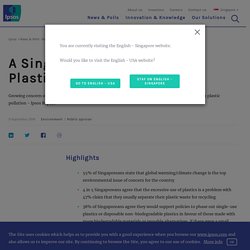
Attitudes towards Climate Change. Why Plastic Waste Is a C-Suite Issue. Plastic waste is a C-suite issue because plastic is more pervasive across our global economy than just about any other manufactured substance, and the waste from single-use plastic packaging alone represents $100 billion of economic value....
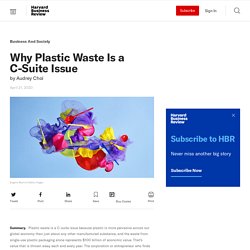
Since its invention and widespread introduction into the economy some 70 years ago, plastic has become a valuable part of business and daily life. So much so, in fact, that we have created more than 8.3 billion metric tons of it around the world. Banning Straws and Bags Won’t Solve our Plastic Problem. It seems to be the summer of plastic bans. Starbucks, Hyatt, the city of Seattle and others have all committed to phase out plastic straws. Stafford Township in New Jersey passed a plastic bag ban just last month, joining dozens of other American cities and states imposing taxes or bans on single-use plastics.
But is this a good thing? Plastic pollution is a huge problem—and it’s not too late to fix it. The global campaign to gain control of plastic waste is one of the fastest-growing environmental causes ever mounted. Yet it hasn’t been enough to make a dent in the growing tonnage of discarded plastic that ends up in the seas. In the next 10 years, the waste that slides into waterways, and ultimately the oceans, will reach 22 million tons and possibly as much as 58 million tons a year. And that’s the “good” news—because that estimate takes into account thousands of ambitious commitments by government and industry to reduce plastic pollution. THE PROBLEMS WITH PLASTICS. We Depend on Plastic. Now We’re Drowning in It. This story is part of Planet or Plastic?
—our multiyear effort to raise awareness about the global plastic waste crisis. Learn what you can do to reduce your own single-use plastics, and take your pledge. Read this story and more in the June 2018 issue of National Geographic magazine. If plastic had been invented when the Pilgrims sailed from Plymouth, England, to North America—and the Mayflower had been stocked with bottled water and plastic-wrapped snacks—their plastic trash would likely still be around, four centuries later. If the Pilgrims had been like many people today and simply tossed their empty bottles and wrappers over the side, Atlantic waves and sunlight would have worn all that plastic into tiny bits.
We should give thanks that the Pilgrims didn’t have plastic, I thought recently as I rode a train to Plymouth along England’s south coast. No one knows how much unrecycled plastic waste ends up in the ocean, Earth’s last sink. What is the problem with plastic? - CBBC Newsround. Getty Images Plastic is really useful and we use it every day. Kids vs. Plastic. The Plastic Problem. By 2050 there will be more plastic than fish in the oceans. It’s an environmental crisis that’s been in the making for nearly 70 years.
Misperceptions of Plastic. Plastic or paper: Which bag is greener? What are plastics. Plastics is the term commonly used to describe a wide range of synthetic or semi-synthetic materials that are used in a huge and growing range of applications. Everywhere you look, you will find plastics. Single-Use Plastics 101. Jump to Section A straw with our iced coffee, a plastic bag to carry our takeout, a wrapper on a candy bar: taken individually, each seems harmless. These modern conveniences are so ubiquitous—and so quickly thrown out—that they hardly register in our minds. Plastic Consumption - an overview. How plastics are made. Plastics are derived from natural, organic materials such as cellulose, coal, natural gas, salt and, of course, crude oil.
Straitstimes. Singapore uses at least 1.76 billion plastic items a year, or almost one item per person per day. But fewer than 20 per cent of these are recycled, according to the Singapore Environment Council (SEC). The 5 Most Common Plastics & Their Everyday Uses. Despite being all but unheard of until the 1920's, plastic materials have effectively permeated every aspect of modern day life, from the microchips in your computer to the bags you carry your shopping in.
Wait, Plastic Can Be Good for the Environment? Good Question: Why Do We Use So Much Plastic? MINNEAPOLIS (WCCO) — On Tuesday, California became the first state to ban single-use plastic bags like the ones used in Target and grocery stores across the country. The plastic bags will be phased out over the next two years, but people can still use them for vegetables and meats.
Paper bags will cost 10 cents while reusable bags will be free to use. Plastic pollution: Cleaner seas and plastic recycling with Norwegian technology - The Explorer. Are plastic-eating bacteria the solution to ocean pollution? It’s not that simple, science shows. Recent reporting on the discovery and enhancement of plastic-dissolving enzymes in bacteria made me stop and think about what this might mean for the plastic pollution problem that is plaguing oceans and choking the world’s coral reefs. While this development is interesting and draws necessary focus to an immense environmental challenge, it is premature to guess whether these kinds of enzymes might provide an effective silver bullet for treating plastics floating in the five great gyres of the sea. Plastic Pollution. Environmental Impact of Single-Use Plastics Overstated. 10 Facts About Single-use Plastic Bags. Plastic pollution facts and information.
10 tips to reduce your plastic use. Eu.indystar. Packaging Waste. Plastic Readworks. Straitstimes.com FairPrices no plastic bag initiative extended for another year following positive response.